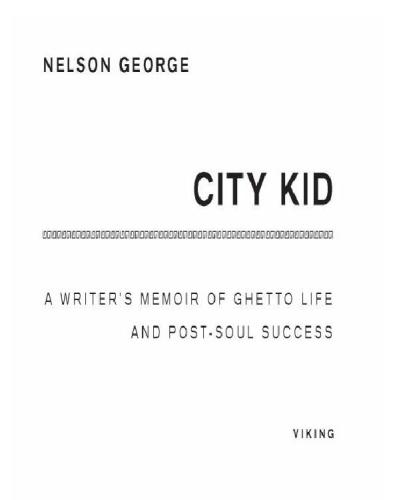
City Kid
A Writer's Memoir of Ghetto Life and Post-Soul Success
کتاب های مرتبط
- اطلاعات
- نقد و بررسی
- دیدگاه کاربران
نقد و بررسی

January 19, 2009
In his vivid and charming memoir, novelist and screenwriter George (Hip Hop America
) recounts incidents from an eventful life that has ranged from a tough upbringing by his single mother in Brooklyn in the 1960s to a career of assorted writing gigs in music journalism, television and film. Early in the book, George captures the anxieties of an intelligent child in a dangerous neighborhood, finding solace in his mother's soul records, screenings of Planet of the Apes
and Hemingway and Fitzgerald novels. Later, George provides a welcome and appropriately nerve-wracking portrait of a young New York writer, interning at the Amsterdam News
and writing concert reviews for Billboard
. Slowly, the mature writer and tastemaker emerges, witnessing and shepherding hip-hop's sometimes rocky transition into the mainstream pop-music world, as exemplified by a bizarre concert bill featuring the Commodores, Bob Marley and hip-hop pioneer Kurtis Blow. George's life has been blessed by the presences of an eclectic array of black entertainers, including a young Russell Simmons and a struggling Chris Rock, and he sketches these characters with affection, though at times the book feels more like a collection of anecdotes than a cohesive narrative. Nonetheless, George provides tempting glimpses of the vibrant New York of the recent past.

February 1, 2009
George (The Accidental Hunter, 2005, etc.) chronicles his progression from an impoverished childhood to an accomplished career as a music journalist, novelist and filmmaker, with many stops along the way.
The author was born into a working-class black family in swiftly changing Brooklyn. It was 1957: White families were moving out to the suburbs; African-American and Puerto Rican families were moving in. George's father was absent for much of his youth, and his hardworking mother served as his principal role model. The memoir serves up many images already shopworn from other coming-of-age stories set in New York during the'60s and'70s: stickball in the street, dancing to soul records, trading comic books, etc. George's recollections often seem romanticized, with one notable exception. His colorful descriptions of pop, soul and jazz, the experience of listening to music and his reactions to it, always seem authentic, and they point a clear path to his career as a journalist. He developed his craft at Billboard, New York Amsterdam News and The Village Voice (his dream job). As the author chronicles his professional success, the book's focus shifts to his relationships with an impressive, if lengthy, list of major black artists, including Russell Simmons, Spike Lee and Chris Rock, each of whom gets his own chapter. While these accounts provide a unique perspective on the development of African-American culture, they also fragment the text into choppy, piecemeal sections that abandon the subject of George's family life. He attempts to bring things full circle with concluding chapters on Life Support, a film he directed about his sister's battle with HIV, and a brief account of a family reunion at his niece's graduation.
Uneven but frequently engrossing.
(COPYRIGHT (2009) KIRKUS REVIEWS/NIELSEN BUSINESS MEDIA, INC. ALL RIGHTS RESERVED.)

April 13, 2009
Verdict: Readers who enjoy George's fiction (e.g., Show & Tell), nonfiction (e.g., Hip Hop America), or film and TV production and direction work (e.g., Life Support) will appreciate this story of how he used his love of writing and music to transcend his circumstances. Background: George grew up in the Samuel J. Tilden housing project in the Brownsville section of Brooklyn, NY. Through his mother's music and book collection, he discovered a love of soul music and literature. He writes of this passion motivating and sustaining him as he graduates from St. John's University, becomes a successful journalist, and collaborates with some of the most influential people in black popular culture, including Spike Lee, Russell Simmons, Bryant Gumbel, and Chris Rock.-Joshua Finnell, McNeese State Univ. Lib., Lake Charles, LA
Copyright 2009 Library Journal, LLC Used with permission.

February 15, 2009
Suddenly black nerds were chicnot just athletes, musicians, and activists. The award-winning author of hip hop America (1998) and other books and films on popular culture writes about his coming-of-age in his Brooklyn inner-city neighborhood. Rooted in Georges personal experience, this memoir is also a lively look back at historical changes in popular music, film, and writing. A voracious reader, Georgewas thrilled as a kidby Wright and Baldwin but also by Hemingway and Fitzgerald. As a music critic at Billboard, then the Village Voice, he charted the journey from segregation to integration via popular music, connecting the established world of rhythm and blues with the still relatively underground world of rap. His moving family story grounds the bookaccounts of his still-troubled relationship with his druggie dad and his adult reconciliation with his sisterbut it is the wry, sharp, unpretentious cultural analysis that is at the core here, especially what he calls the exhilarating mix of fear and freedom that comes with listening to music.(Reprinted with permission of Booklist, copyright 2009, American Library Association.)

























دیدگاه کاربران